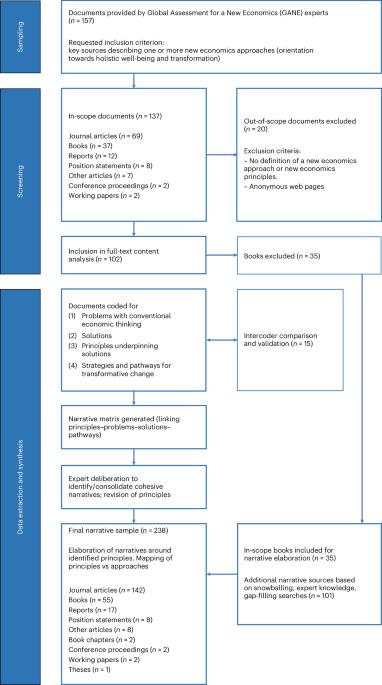在全球危机时期改变经济学的十大原则
IF 27.1
1区 环境科学与生态学
Q1 ENVIRONMENTAL SCIENCES
引用次数: 0
摘要
经济体制的转型被广泛认为是解决相互影响的全球危机的关键。寻求人类和地球整体福祉的非常规经济方法具有变革潜力,但将其纳入主流受到既得利益和知识锁定的阻碍。它们也是分散的,难以发展出足够的话语权,以在政策上获得更广泛的牵引力。为了保持一致性,我们对来自科学和实践的238个文献来源进行了定性内容分析。我们确定了十项生态、社会、政治经济和整体原则,涵盖了38种经济方法。它们包括:(1)社会生态嵌入性和整体幸福感;(2)跨学科和复杂性思维;(3)生长限制;(4)自然资本可替代性有限;(5)再生设计;(6)人与价值观的整体观;(七)公平、平等、正义;(8)关系与社会解放;(9)参与、审议和合作;(10)后资本主义和非殖民化。我们还考虑在全球危机背景下应用这些原则的机会和障碍。我们的研究结果可以帮助巩固变革的经济方法,支持未来综合概念模型、方法和政策解决方案的努力,并在全球南方背景下更明确地验证已确定的原则。具有可持续性变革潜力的非常规经济方法过于分散,无法在政策上获得足够的牵引力。通过定性内容分析,本研究使许多讨论此类方法的文件具有连贯性,以支持将其纳入主流的努力。本文章由计算机程序翻译,如有差异,请以英文原文为准。

Ten principles for transforming economics in a time of global crises
Transformation of economic systems is widely regarded as essential for tackling interacting global crises. Unconventional economic approaches seeking holistic human and planetary well-being have transformative potential, but mainstreaming them is hampered by vested interests and intellectual lock-ins. They are also diffuse and struggle to develop sufficient discursive power to gain more widespread traction in policy. To bring coherence, we undertake a qualitative content analysis of 238 document sources from science and practice. We identify ten ecological, social, political economy and holistic principles cutting across 38 economic approaches. They include: (1) social–ecological embeddedness and holistic well-being; (2) interdisciplinarity and complexity thinking; (3) limits to growth; (4) limited substitutability of natural capital; (5) regenerative design; (6) holistic perspectives of people and values; (7) equity, equality and justice; (8) relationality and social enfranchisement; (9) participation, deliberation and cooperation and (10) post-capitalism and decolonization. We also consider opportunities and barriers to applying these principles in the context of global crises. Our results can help consolidate transformative economic approaches and support future efforts to synthesize conceptual models, methodologies and policy solutions and to validate the identified principles more explicitly within global south contexts. Unconventional economic approaches with transformative potential for sustainability are too dispersed to gain sufficient traction in policy. With qualitative content analysis, this study brings coherence to many documents discussing such approaches to support efforts towards mainstreaming them.
求助全文
通过发布文献求助,成功后即可免费获取论文全文。
去求助
来源期刊

Nature Sustainability
Energy-Renewable Energy, Sustainability and the Environment
CiteScore
41.90
自引率
1.10%
发文量
159
期刊介绍:
Nature Sustainability aims to facilitate cross-disciplinary dialogues and bring together research fields that contribute to understanding how we organize our lives in a finite world and the impacts of our actions.
Nature Sustainability will not only publish fundamental research but also significant investigations into policies and solutions for ensuring human well-being now and in the future.Its ultimate goal is to address the greatest challenges of our time.
 求助内容:
求助内容: 应助结果提醒方式:
应助结果提醒方式:


